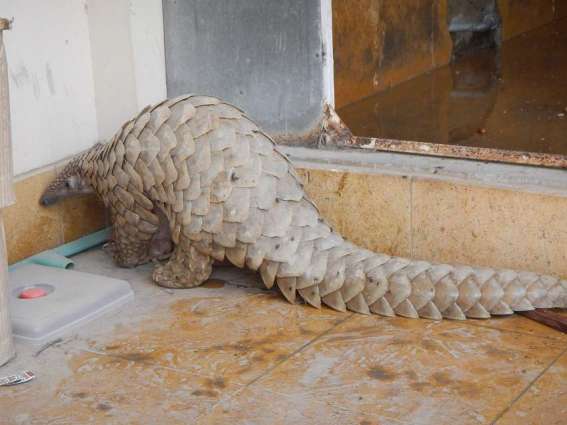Pangolins, world’s most heavily trafficked mammals are confronting multiple threats across its habitat range worldwide
Karachi,(Pakistan Point News - 16th Feb, 2018 ) : PangolinPangolins, world’s most heavily trafficked mammals are confronting multiple threats across its habitat range worldwideere is urgent need to raise awareness among general public and sensitise students, researchers and communities regarding the social and ecological significance of the species. Of the eight species of pangolins, the Indian pangolin (Manis crassudata) is found in Pakistan.
It is listed as endangered in the IUCN Red List of Threatened Species since 2009. Despite being protected under Federal and provincial wildlife laws in country, the species is rapidly declining as a result of poaching for illegal international trade. Pakistan lies along a strategic air, land and sea route, forming a gateway to East Asia, which makes it a major source country for illegal wildlife trade. Due to increasing demand for meat, scales and derived products, the Indian pangolin remains one of the highest trafficked animal sourced from Pakistan.
According to IUCN estimates, over 50 per cent decrease in the global pangolin population will occur over the next 21 years. In order to protect the species against illegal trade, WWF-Pakistan has carried out several projects. Recently, WWF-Pakistan developed a National Plan of Action for combatting illegal wildlife trade and trained more than 500 officials from the law enforcement agencies to monitor illegal wildlife trade, and introduced stakeholders to the legal framework for regulating the trade.
According to Dr. Babar Khan, Director Wildlife and Regional Head (Sindh and Balochistan), WWF-Pakistan poaching, illegal hunting and trafficking of the animal to a few countries including China and Vietnam has drastically reduced its population in Pakistan. He also shared that WWF-Pakistan is working in close coordination with provincial wildlife departments to tackle illegal wildlife trade in country. WWF-Pakistan has recently initiated a project to protect and conserve remaining populations of pangolins in country.
He also said that pangolin, a scaly anteater, is hunted for its scales, meat and other body parts and products. ‘There is an urgent need for creating awareness among the general public especially youth because of their non-familiarity with this animal, usually the panic is created if a pangolin is found at any location’, he added. While, Muhammad Waseem, Manager, Pangolins Project, WWF-Pakistan shared that WWF’s newly initiated project titled “Saving the Pangolins of Pakistan-Conservation of the Indian Pangolin through Research and Management” will help counter its trafficking and address pangolin poaching and trade in Kirthar, Sindh; Potohar, Punjab and Azad Kashmir.
He explained that this project will help in conserving the Indian pangolins by addressing critical data gaps regarding the illegal wildlife trade, weak deterrence for smugglers, lack of government resources (including capacity, equipment, technology, etc.) and a lack of interagency coordination. Eight species of the pangolin exist in the world particularly in Asia and Africa and the only one species that is Indian pangolin is found in Pakistan. It is reported in various parts of the country including hilly and sandy areas of Sindh, Balochistan, KPK and Punjab. According to International Union for Conservation of Nature (IUCN) Red List, all species of pangolin are endangered and require immediate conservation efforts




